By KATIE EUBANKS
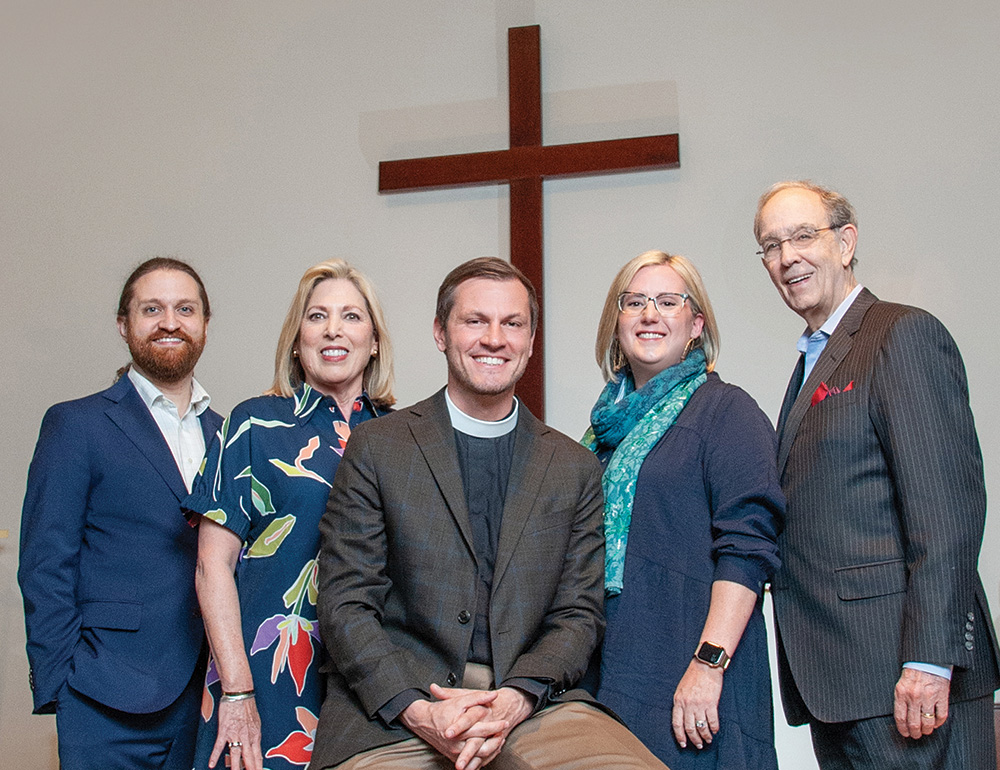
From left: Jon David Cole, Gina Morris, Father Ryan Streett, Angela Morrison and Bill Morris at Holy Trinity Anglican Church in Madison.
For folks whose blood runs Baptist, the little grey building with the red door on Bozeman Road might seem like a portal to another world: Holy Trinity Anglican. What’s an Anglican, anyway?
But for members of Holy Trinity — with backgrounds ranging from Baptist to Catholic — this Madison County church has become the soil where their faith in Christ has grown.
Gina Morris, one of several members gathered in the Holy Trinity sanctuary for this interview, sums it up: “Nobody (here) has an agenda but to worship the Lord.”
From 1 ‘flavor’ to many
“It was a mustard-seed beginning,” says founding member Bill Morris (no relation to Gina).
In the early 2000s, Bill and his wife, Camille, along with a handful of other Jackson metro couples, felt God calling them to something different. They just weren’t sure what.
They started meeting regularly, studying the Bible and praying together. As the group grew, “we knew we needed to be under authority,” Bill says. They decided to form an official congregation in the Anglican Church in North America (ACNA).
The Holy Trinity website explains the most important ACNA beliefs first:
“Jesus Christ is the Way, the Truth, and the Life: No one comes to the Father but by Him. The Holy Bible, Old and New Testaments, is the inspired Word of God, containing all things necessary for salvation, and to be the final authority and unchangeable standard for Christian faith and life.”
Otherwise, what sets Anglicans apart is their worship service, which culminates each week not in the pastor’s sermon (though it is definitely present), but in the Lord’s Supper.
Holy Trinity member Jon David Cole loves that Anglican worship is rooted in the Book of Common Prayer, described as “the scripture arranged for worship,” which has been in use since the 1600s.
“I didn’t know I could find a church that was faithful to God’s Word but also had an ancient foundation,” Jon David says. “If Martin Luther walked in, he’d know exactly what was going on.”
That said, it isn’t just one type of person who is showing up at Holy Trinity.
“Initially, it was one flavor,” Jon David says. “Then people flooded in from everywhere.”
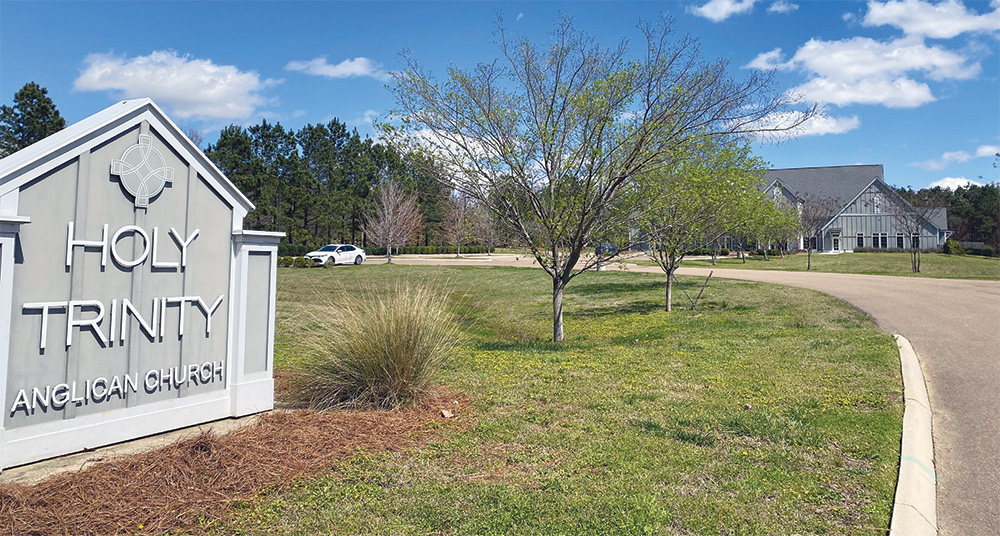
‘We’re not in competition’
When Angela Morrison and her family started attending Holy Trinity, “we were sort of tired and needed a place to rest,” she says.
“We have four kids, a lot of busyness. … There was a body of Christ that didn’t just welcome you in but wanted to know your story — with no judgments. They wanted to pray with me and for me.
“It’s not superficial,” Angela says, noting the tendency for Christians to smile and say, “I’m good” on a Sunday. “People really know your story.”
Each week during the Lord’s Supper, the Holy Trinity prayer team stands ready to intercede for anyone who needs it, and Angela has taken advantage of that.
She also appreciates that “there was never a question what was coming from the pulpit” as she and her family stepped into a new environment.
“This church (stands) on the solid rock of Christ. They have scripture written on the studs.”
When that scripture is proclaimed, it even reaches Angela’s son Clark, who’s 14.
“As we’re leaving one Sunday, he looks at me and says, ‘Mom, Father Ryan’s sermon was insane!’” (That’s a good thing, in case you don’t speak teenager.) And Clark has been able to connect with both rector (senior pastor) Father Ryan Streett and Father Eric Geisbert, assistant for youth and family ministries, in meaningful ways, Angela says. “They’re not untouchable.”
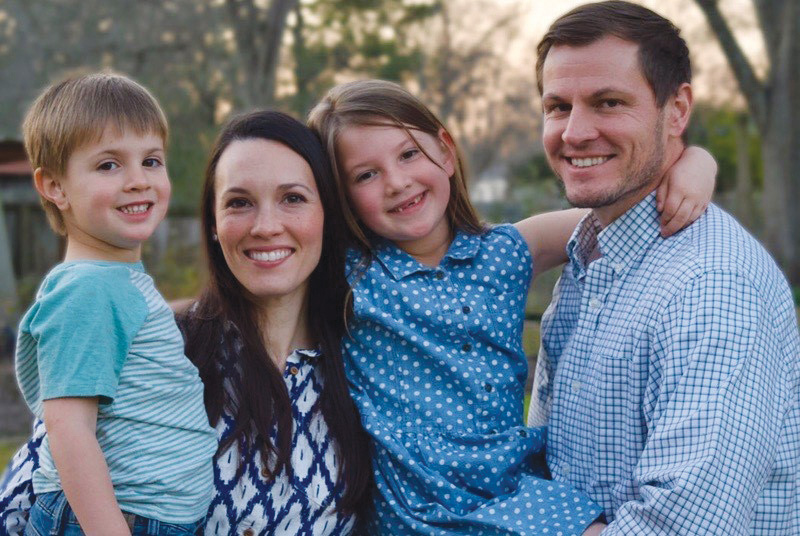
From left: Jonah, Anna, Cecily and Ryan Streett.
That sense of connection at Holy Trinity is most present during the Lord’s Supper.
“What’s humbling and beautiful at the same time, is knowing you’re invited to be at the foot of the cross — and you never know who will be on your right and on your left,” she says.
Sometimes the person on your left didn’t know they’d be there the night before. That was the case for Gina, who woke up on a rainy Sunday in February 2011 and felt God nudging her toward Holy Trinity.
“It was storming, raining cats and dogs that day. But I knew God was telling me to go,” she says. Despite being only vaguely familiar with Holy Trinity then, she opened her computer, found the service time, and went.
She knew a few people, like Bill and Camille, but more importantly, “I just felt the Holy Spirit,” Gina recalls. The result? “I’ve never gone anywhere else (since).”
She’s quick to say, “We don’t want to make it sound like we know best and everyone else is wrong. But this is the church where God wanted me to be.”
Bill agrees: “We’re not in competition with other orthodox churches. We’ve got the same mission as the Presbyterian church across the street, and the Pentecostals down the street, and the Baptist church a little farther down.”
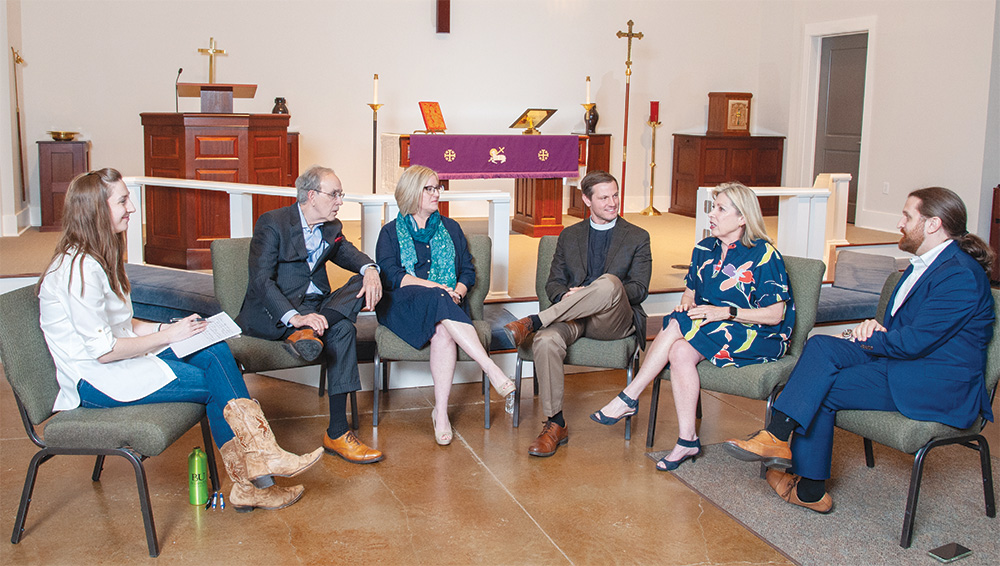
MCL Editor Katie Eubanks (far left) interviews (from left) Bill Morris, Angela Morrison, Father Ryan Streett, Gina Morris (no relation to Bill), and Jon David Cole at Holy Trinity.
Diversity, not division
By 2014, God was drawing more and more people to Holy Trinity, and the church was holding services at the St. Anthony Catholic School gym in Madison after bouncing around several locations. They launched a capital campaign to build their own worship center.
“We saw miracles in the financial realm,” Bill recalls. “It was obvious God wanted to build this church.”
Especially since Bill insisted at the time, “Nobody’s going to be called on (to give)” — which is basically the polar opposite of how a pledge drive works.
Holy Trinity held a dinner at The Country Club of Jackson. Fifty or 60 people came, and church members shared testimonies about how Holy Trinity had impacted them.
“We raised more than we could’ve possibly imagined that night,” Bill says, “without any (coercion).” Donations were anonymous. “Only our treasurer, Forbes Watson, would know, and he never tells anyone anything.”
Holy Trinity has a three-phase construction plan and has completed phase one. Last year they started raising money for the other two phases, held another dinner, and brought in more than twice the amount they raised in 2014. They’ll start work on phase two, including their education building, soon.
“I was astounded at the first (capital campaign),” Bill says, “but God said, ‘You think that’s something?’”
“(God) saw inflation coming up,” Ryan quips with a laugh.
Holy Trinity is home to folks from Baptist, Methodist, Presbyterian and Catholic backgrounds. They come from all over metro Jackson and even as far as Kosciusko. The congregation includes young and old, black and white, “people with money and people with none,” Bill says.
“We’re not driven by issues, which typically divide churches. You’d have to hunt for a political sticker on a car.” While political beliefs certainly differ among members, “we don’t bring that stuff in here,” he says.
Also, because the church is so new, “Nobody has any claims on it (like) ‘My grandmother donated this window.’”
“We all have one goal: to learn and live God’s Word,” Gina says. “Satan has tried many times to get a foothold. Don’t think there’s never trials and tribulations. But it’s been beautiful to watch this church come together and pray.”
With members from various backgrounds, baptism could be a lightning rod of division at Holy Trinity. The ACNA baptizes infants, not as a mark of salvation but “as a correct way of bringing children into the care of the church,” says Jon David. Then when someone is ready to own their relationship with Christ, he or she goes through the process of confirmation with a church mentor, who walks them through what their faith means. (At Holy Trinity, confirmation happens when that person is ready, not at a predetermined age.)
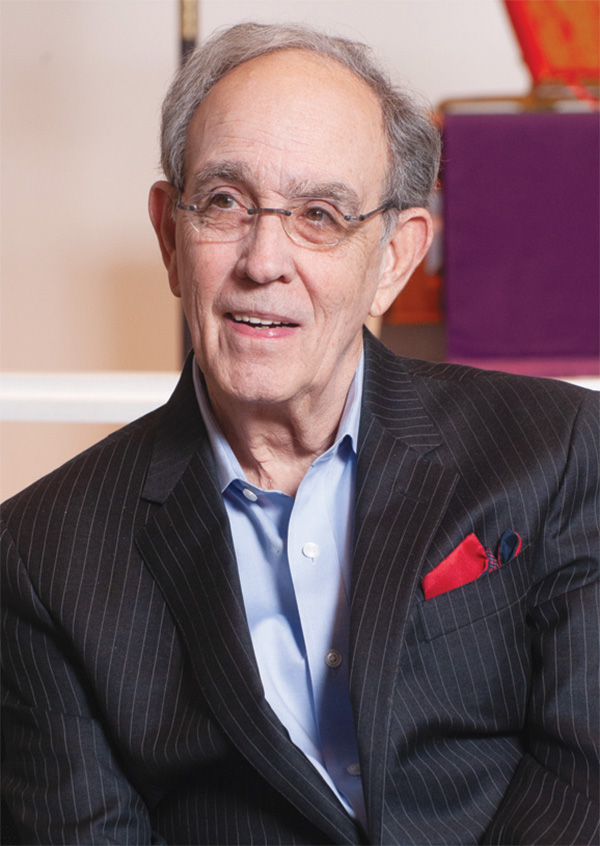
“I’ve not heard one thing out of (Father Ryan’s) mouth that was not totally consistent with the Word of God,” says church member Bill Morris of the preaching at Holy Trinity.
That’s different than Baptist churches, where baptism happens not at infancy but only after conversion.
Holy Trinity will happily accommodate believers who want to receive baptism by immersion. But Anglican churches don’t include “dunking” baptismals. The solution? Like many contemporary church plants, Holy Trinity performs baptisms in a horse trough, out on the lawn in God’s creation.
At the end of the day, whether a baby is dedicated or baptized, the ultimate goal is for that child to come to saving faith in Jesus Christ, Ryan says.
“They’re given a gift in their baptism as an infant — but what good is that gift if you never open it via faith in Christ?”
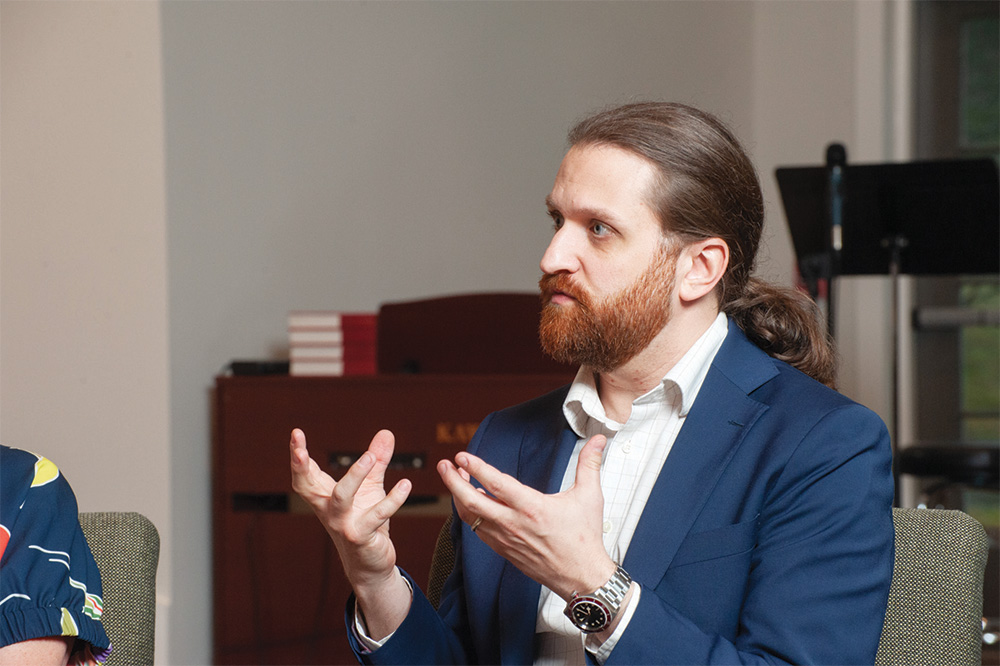
“If Martin Luther walked in, he’d know exactly what was going on (at Holy Trinity),” says church member Jon David Cole.
‘We’ve already said yes in our hearts’
Several “good, godly men” have led Holy Trinity, Gina notes. Former rectors have included Rev. Tim Smith and Canon Keith Allen, who accepted a call to a church in Vero Beach, Florida a couple of years ago.
Ryan’s story might be a little different than theirs. “God met me in a very dark place,” the South Carolina native says, and after he got saved and called to ministry, it was an Anglican “biker priest” who mentored him.
“He was a guy who had worked construction for 30 years and then become a priest in his 60s,” Ryan says. The priest no longer rode motorcycles but proved to be a kindred spirit for Ryan, who at that time was training to become a Presbyterian minister and working on his master’s degree.
Ryan’s master’s thesis was about a group of 19th-century pastor/scholars who strove for “liturgical renewal.” That got him curious. Then he discovered the Book of Common Prayer.
“(That) really helped to ground this ADD person in the daily rhythms of worship — the confession of sins, the reception of grace, the praise of God, and the systematic reading of the scriptures, along with experience of an Anglican communion service,” Ryan says.
Between the mentor, the thesis, and the Book of Common Prayer, Ryan became an Anglican and joined an ACNA church. Eventually, the rector there asked him to consider becoming a priest, and he did.
That same rector, now bishop of South Carolina, put Ryan’s name in the hat when he was serving in South Carolina and Holy Trinity was looking for a new rector in early 2020.
When Holy Trinity’s search committee called Ryan, he noticed they were “a people of prayer,” he recalls.
Also, normally, when an ACNA church looks to hire a rector, the candidate interviews with the search committee and the vestry, or leadership team. “But this is such a family, they wanted interviews with the congregation,” Ryan says. That left an impression.
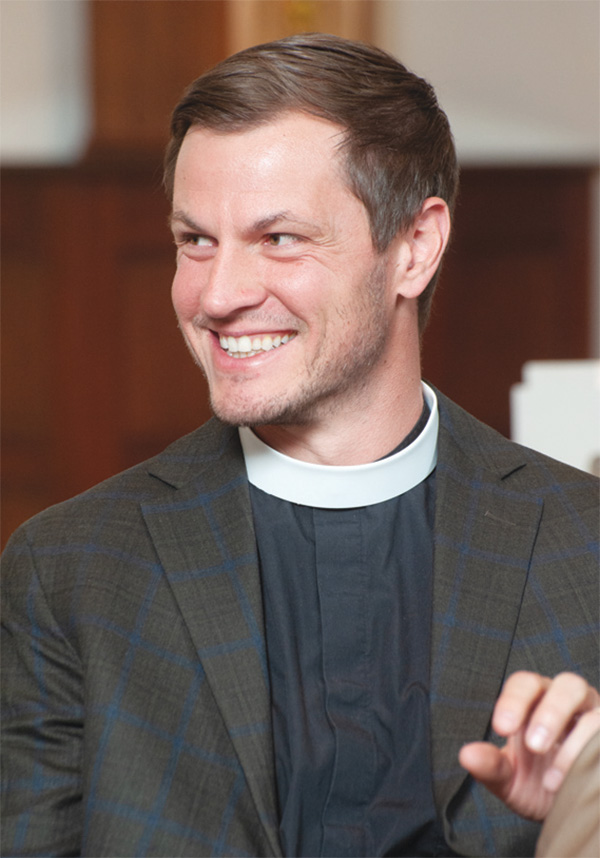
Father Ryan Streett, rector of Holy Trinity.
And the Streetts — both Ryan and his wife, Anna — left an impression on Holy Trinity too, Bill says.
After one of the congregational interviews, Bill asked to pray over the couple. His prayer went something like this: “Lord, I don’t know who You’ve chosen for us, but I’m going to be very disappointed if it’s not Father Ryan.”
Before Ryan and Anna left town after a series of interviews that May, they both felt the same way. After discussing it as a couple, Ryan says, “I grabbed Gina and Forbes (Watson), who was head of the search committee, (and said) ‘I just want you to know, if you call us, we’ve already said yes in our hearts. We love you guys.’”
Gina still tears up thinking about it. She and the rest of the committee were so confident, they didn’t interview anyone else. They called Ryan that same night while he and Anna were visiting her grandfather in Como, Mississippi. The Streetts would move to the metro area in July 2020.
Like Angela, Bill praises what he hears from the pulpit at Holy Trinity.
“I’ve not heard one thing out of (Father Ryan’s) mouth that was not totally consistent with the Word of God,” Bill says. “He’s one of the finest preachers, but he doesn’t preach. He tells the unadulterated truth in love. (And) he’s so humble in spite of how good he is.”
Quick to deflect, Ryan smiles and replies, “The devil tells me that all the time.”
Anna, too, is humble — and accessible, Angela says. “I love the accessibility of the clergy and everyone in this parish.”
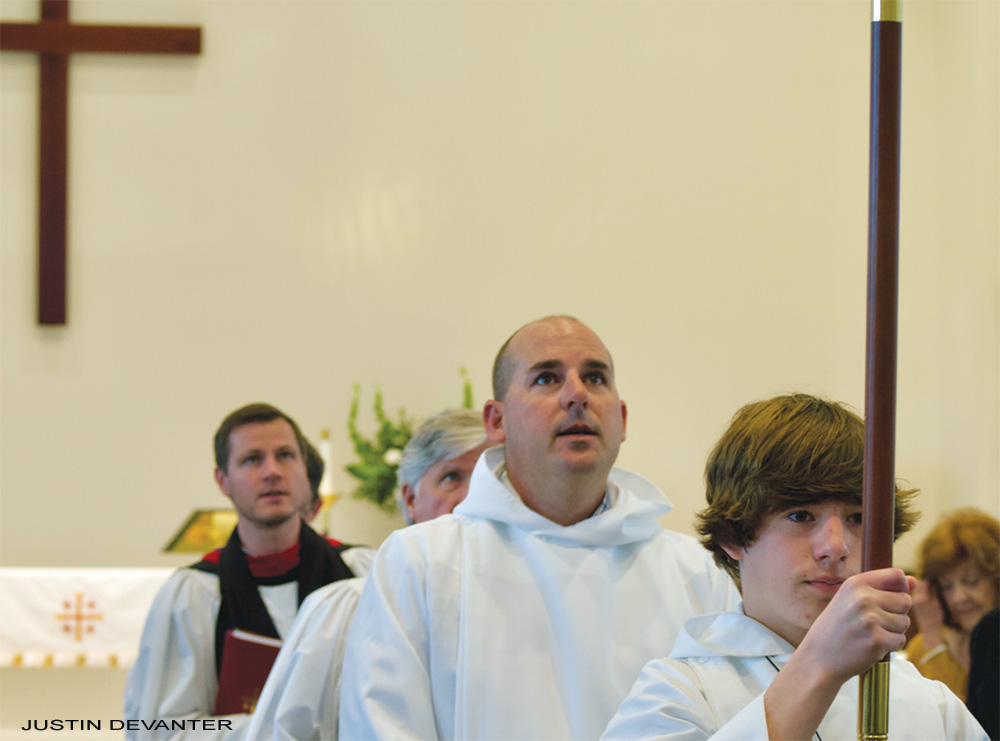
Worshippers leave the church and go into the world to be witnesses with their eyes on the cross.
‘We imagine the roof being peeled off’
An Anglican service is often called a liturgy, which means “the work of the people,” as the congregation “actively participate in the drama of the Gospel,” according to the Holy Trinity website. That includes everything from reciting the Nicene Creed to participating in prayers like this:
Minister: Lamb of God, you take away the sin of the world;
People: have mercy on us.
A typical service at Holy Trinity includes all the elements one would expect at church: prayer, praise, confession of sin, and the proclamation of God’s Word. All of those elements come together in an intentional way that “forces you to slow down,” the Holy Trinity website says, and reminds you why you’re at church to begin with.
Despite the formality of the service, it’s not rigid, Jon David says. “You’ll find a good mixture of traditional and modern worship.”
And while you might not see folks running the aisles, the Holy Spirit is very present, Ryan says.
“The Spirit is the One that enables us to pray and to worship. The Spirit evacuates space and time, and it’s as if Christ is here with us.
“When we get to that sanctus (when the congregation recites ‘Holy, holy, holy, Lord God of power and might … ’), you’ll see clergy with our heads down, and that’s us imitating the seraphim from Isaiah 6. They’re these magnificent creatures, but they cannot look at God without coming undone,” Ryan says.
“Then we look up, and we imagine the roof being peeled off this place.”
That kind of awareness of God’s presence necessitates getting right with Him — and with our neighbors.
“(We want to) make sure we’re at peace horizontally before we come to the table (for the Lord’s Supper),” Ryan says. “I’ve seen that happen. Someone will say, ‘Dude, I was totally a jerk. I should not have said that,’ and the other person will (pass the peace of Christ).”
The number one thing that unites believers at Holy Trinity is the table — the observance of the Lord’s Supper. After taking time for both corporate and personal prayer and confession, members receive the bread and the wine as a symbol of Christ’s body and blood, given as payment for their sins.
“(That’s) where we are most ourselves,” Ryan says.
Jon David says taking communion is the most important thing he does each week.
“To have that type of sound theology and teaching, and to be forced every week to admit your need for a Savior and come to that table … Wild horses couldn’t keep me from that table.”
